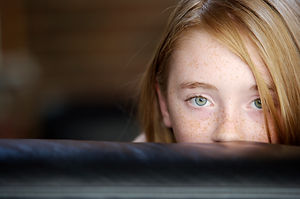
Trauma and attachment informed family placements for children and young people with complex needs


Cut loose and bewildered - a story of curly roads, snoy beaches and lessons learnt
The first utterance of “don't like” happened 30 miles into our 170 mile trip to Devon. Our child (pseudonym Charlie from here on in) did not like fast motorways. Reassuring him that the 24 ft touring caravan would prevent us hurtling beyond 55 mph left us thinking no more of the “don't like” utterance.
As it happened, “don't like” was to become a significant word over the next 36 hours – [which in our bewildered state felt like 36 days]. It so happened that Charlie didn’t like service stations, country roads, Devon (in its entirety apparently), silence in the car, music in the car, feeling hot and feeling cold. Neither did he like the rural park (theme park attached) we had booked for 7 nights, or the grass which was too prickly, or the trees which were too tall. In fact everything made of God’s fair hand or man’s invention was too tall, short, dark, light, fast, slow and any other descriptive you can think of.
We had hoped arriving at the park and setting up the caravan and awning would reduce anxiety. It did in fact only serve to heighten ours! Putting up a caravan awning can test even the strongest relationships. I felt I had lost most of my hair and some of my teeth by the time we had finished.
An ice cream delivered temporary reprieve and we decided, it being 28 degrees, to take ourselves down to the coast so we could catch a sea breeze and let the dogs off lead for a paddle. 15 minutes and only one “don't like” later and we turned onto the coastal road, a road that hemmed a rugged cliff side and wound gently for 2 miles to the sea. Mistake. We very quickly found out the “don't like” list was not finished. Charlie’s anxiety levels were at fever pitch and winding roads, corners, cliffs, sandy beaches, pebbly beaches, the smell of sea air and sea gulls (big or small) were added to the list without him even drawing breath between sentences. Our 18 year old son, patience of Job, was shooting hard stares from the back seat and even the dogs were looking dejected.
We managed a walk on the beach and even ventured to the waters edge, skimmed stones and chatted a while. Returning to the car signalled a return to the state of “don’t like”. We were in turmoil, almost as anxious as our child and clueless as to what to do next. What we did do was probably a natural response … it was however looking back a scared response, and a response that stepped outside of therapeutic.
What we did was feel sorry for ourselves. We thought how much we had looked forward to this holiday. How unfair it seemed that our child could spoil it in this way. How we could not manage without our holiday and how tired we felt. The next thing we did was telephone our agency for the 24/7 support that was promised. The lady who answered was well known to us, allowed me to vomit anxiety down the telephone, demand someone collect our child for respite and allow us to enjoy what we’d so looked forward to. The response was not what was expected ……….. we had been heard but there was no-one immediately able to drive to Devon, however we could discuss our issues further when our support worker returned from dealing with a traumatised child. That conversation ended with a decision to talk about respite in the morning.
There are times when receiving nothing in response to one’s demands is exactly what is needed. You see our anxiety had clouded our judgement. Our desire for our deserved holiday to be perfect had blinded us to what was really happening. Charlie was not being horrid or awkward, neither was he being a big fat holiday spoiler. He was quite simply petrified. We had removed him from home, we had taken him somewhere different. In the past somewhere different was usually the end of one thing and the beginning of yet another foster placement, or spell in a residential unit. Our child no longer had the few things he had become used to – the same bed, a semi-familiar environment. He was also in a place where there were an apparent 100+ happy families, and he felt guilt for the family he no longer saw, and for the enjoyment he might have in their absence.
All of this revelation became clear as we settled for bed. Charlie lay in his top bunk, tucked tightly under his quilt despite the heat. He looked at me and simply asked “was I put in care for my own good or just cos no-one really wanted me anymore?”. My need to enjoy what I felt I had earned dissolved immediately and I saw a child who deserved more than I felt I had earned …….. his choice had been no choice, he got what he hadn’t deserved or earned. I simply said I did not know, but that if he allowed us to we would love him, care for him and be there – for however long he needed or wanted us. We didn’t say too much more, other than reassure our child that he was as valuable as us, and encourage him to rest well and sleep tight.
We had a very different kind of discussion with our support worker the following morning – one in which we thanked our agency for providing space for us to think. That space enabled our child to reveal his doubts, fears and vulnerabilities, and for us to journey towards becoming the carers we needed to be. Carers who can put their child’s needs above their own. We only had a small window into our child’s word through his sentence at bedtime, but it showed us a landscape we never had to inhabit – one in which a small child, through no fault of his own, was removed from family without knowing why, and which led to a life of living with others, wrapped up in a system which protected him but did not provide a sense of peace or belonging. That is our job now. It is a job that will require us to be patient and to, on occasions, give up what we feel we deserve. I am ever grateful that I have never had cause to ask the question Charlie asked that evening. Nothing we feel we have “earned” will ever stack up against that.
And the rest of the holiday? Well, we had a good time. We took it easy, visited the quieter places, allowed Charlie to share control over what we did, where we went, what we ate ….. and we talked everyday about what we would do when we returned home. We still managed to walk on stony beaches, drive round winding roads and sit beneath tall trees. Most importantly we built in a 6-day countdown to the end of the holiday , you see it was reassurance that we were going back to somewhere he might, at some point, think of as home.
We have had many holidays since, and on our last holiday Charlie referred to the location as “our own piece of solitude”. The use of the word “our”, as many foster carers will appreciate, was monumental – it demonstrated belonging.